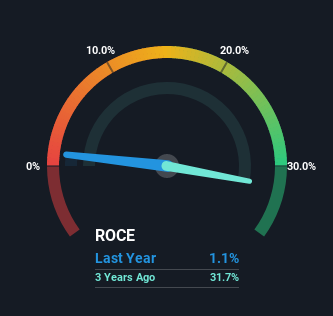Here's What's Concerning About Viaplay Group's (STO:VPLAY B) Returns On Capital
If we want to find a stock that could multiply over the long term, what are the underlying trends we should look for? Firstly, we'd want to identify a growing return on capital employed (ROCE) and then alongside that, an ever-increasing base of capital employed. Put simply, these types of businesses are compounding machines, meaning they are continually reinvesting their earnings at ever-higher rates of return. However, after investigating Viaplay Group (STO:VPLAY B), we don't think it's current trends fit the mold of a multi-bagger.
Understanding Return On Capital Employed (ROCE)
For those that aren't sure what ROCE is, it measures the amount of pre-tax profits a company can generate from the capital employed in its business. Analysts use this formula to calculate it for Viaplay Group:
Return on Capital Employed = Earnings Before Interest and Tax (EBIT) ÷ (Total Assets - Current Liabilities)
0.011 = kr138m ÷ (kr22b - kr9.1b) (Based on the trailing twelve months to December 2022).
Therefore, Viaplay Group has an ROCE of 1.1%. Ultimately, that's a low return and it under-performs the Media industry average of 10%.
View our latest analysis for Viaplay Group

Above you can see how the current ROCE for Viaplay Group compares to its prior returns on capital, but there's only so much you can tell from the past. If you'd like to see what analysts are forecasting going forward, you should check out our free report for Viaplay Group.
What Does the ROCE Trend For Viaplay Group Tell Us?
On the surface, the trend of ROCE at Viaplay Group doesn't inspire confidence. Around five years ago the returns on capital were 47%, but since then they've fallen to 1.1%. However, given capital employed and revenue have both increased it appears that the business is currently pursuing growth, at the consequence of short term returns. If these investments prove successful, this can bode very well for long term stock performance.
On a related note, Viaplay Group has decreased its current liabilities to 41% of total assets. So we could link some of this to the decrease in ROCE. Effectively this means their suppliers or short-term creditors are funding less of the business, which reduces some elements of risk. Some would claim this reduces the business' efficiency at generating ROCE since it is now funding more of the operations with its own money. Keep in mind 41% is still pretty high, so those risks are still somewhat prevalent.
Our Take On Viaplay Group's ROCE
In summary, despite lower returns in the short term, we're encouraged to see that Viaplay Group is reinvesting for growth and has higher sales as a result. However, despite the promising trends, the stock has fallen 11% over the last three years, so there might be an opportunity here for astute investors. As a result, we'd recommend researching this stock further to uncover what other fundamentals of the business can show us.
If you'd like to know about the risks facing Viaplay Group, we've discovered 1 warning sign that you should be aware of.
While Viaplay Group may not currently earn the highest returns, we've compiled a list of companies that currently earn more than 25% return on equity. Check out this free list here.
New: Manage All Your Stock Portfolios in One Place
We've created the ultimate portfolio companion for stock investors, and it's free.
• Connect an unlimited number of Portfolios and see your total in one currency
• Be alerted to new Warning Signs or Risks via email or mobile
• Track the Fair Value of your stocks
Have feedback on this article? Concerned about the content? Get in touch with us directly. Alternatively, email editorial-team (at) simplywallst.com.
This article by Simply Wall St is general in nature. We provide commentary based on historical data and analyst forecasts only using an unbiased methodology and our articles are not intended to be financial advice. It does not constitute a recommendation to buy or sell any stock, and does not take account of your objectives, or your financial situation. We aim to bring you long-term focused analysis driven by fundamental data. Note that our analysis may not factor in the latest price-sensitive company announcements or qualitative material. Simply Wall St has no position in any stocks mentioned.
About OM:VPLAY B
Viaplay Group
Operates as an entertainment provider company in Sweden, rest of Nordics, rest of Europe, and internationally.
Excellent balance sheet and slightly overvalued.
Similar Companies
Market Insights
Community Narratives


Recently Updated Narratives


Q3 Outlook modestly optimistic


Alphabet: The Under-appreciated Compounder Hiding in Plain Sight


MINISO's fair value is projected at 26.69 with an anticipated PE ratio shift of 20x
Popular Narratives


The company that turned a verb into a global necessity and basically runs the modern internet, digital ads, smartphones, maps, and AI.


MicroVision will explode future revenue by 380.37% with a vision towards success



